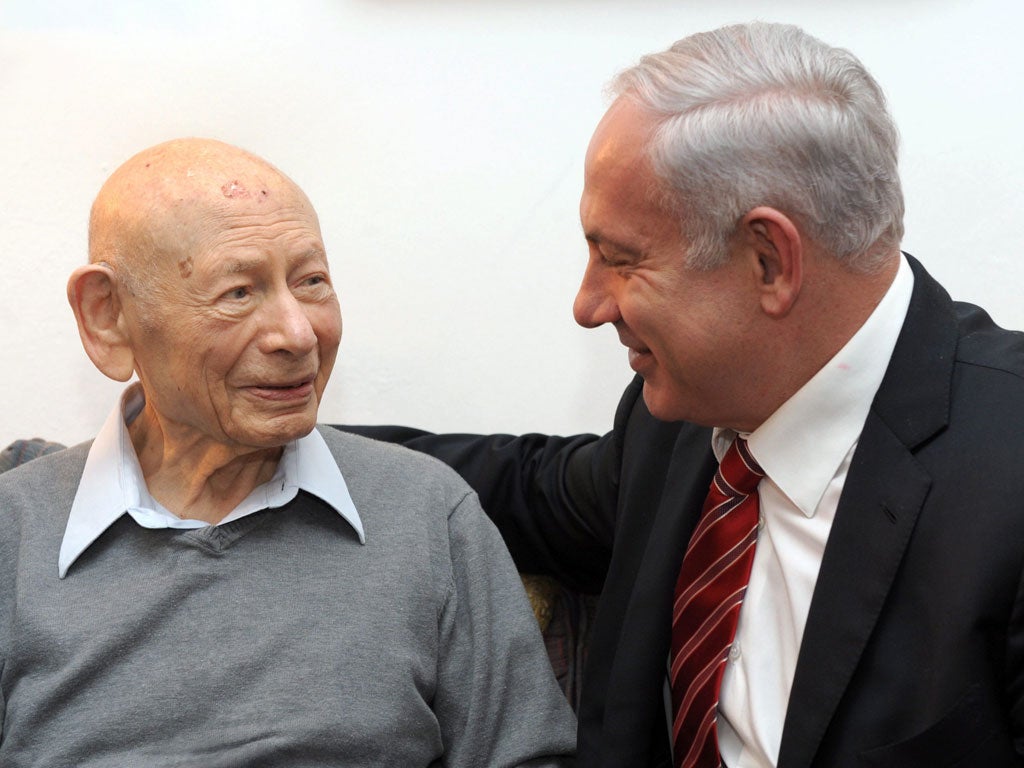Benzion Netanyahu: Zionist whose views had a profound influence on his son Benjamin

Benzion Netanyahu never deviated, in his 102 years, from his hardline Zionist stance which held that no deal would ever be possible between Jew and Arab. In two of his three sons he provided Israel first with a military martyr, who died while rescuing hostages in an audacious commando raid in Africa, and later with its current prime minister, Benjamin.
As a historian of note he argued that through the ages Jews had been targeted not because of religion but for their race: he called it "Jew hatred", maintaining that the persecution could be traced back to ancient Egypt. He declared: "Jewish history is a history of holocausts, while Hitler's genocide was different only in scale."
Although Benjamin Netanyahu has often been described as a hardliner, Benzion's unbending attitudes led him to criticise even some of his son's political decisions. "With Benzion there was no place for compromise, and for that reason he sometimes showed displeasure with needs that his son had as a politician," said the Speaker of the Knesset, Reuven Rivlin.
But father and son were close, with much speculation that the father's influence had helped shape the outlook of the prime minister and inhibited his freedom of movement. While Benjamin has dismissed this theory as "psychobabble", he will now be closely observed for signs of a more flexible approach.
Benzion Netanyahu was born in Warsaw in 1910, the son of an ardent Zionist rabbi, Nathan Mileikowsky, who changed the family name to Netanyahu, or "God-given". The family moved to Jerusalem, where he attended boarding school and went on to take a master's degree in history at Jerusalem's Hebrew University.
In the 1930s Netanyahu became prominent in Revisionist Zionism, a movement which criticised mainstream Zionist organisations as overly moderate and advocated a Greater Israel that would include today's Jordan. Benjamin's Likud party traces its ancestry back to Benzion's revisionist movement. He edited its daily newspaper before it was closed down, then moved to the US, where he served as secretary to the movement's leader, Vladimir Jabotinsky. When Jabotinsky died Benzion became its executive director and an active lobbyist.
While in the US he continued his education, studying Jewish history at colleges in Pennsylvania, Denver and Cornell. Returning to Israel in 1949 he had difficulty securing a university post, since although he was academically qualified he was politically out of step with the prevailing socialism of the time. Instead he joined the team editing the Encyclopedia Hebraica, later becoming its editor-in-chief, as well as author or editor of a number of books, becoming an authority on the experience of Jews in medieval Spain.
His most striking work was his monumental book The Origins of the Inquisition in Fifteenth Century Spain. It was hailed as erudite and meticulously researched, though one Hebrew University historian said of it: "If you ask me, deep down in his heart he feels that everything is a plot against the Jews."
Feeling isolated by the political and academic establishments, he shuttled back and forth to America several times in the years that followed so that his sons spent many years there: Benjamin is regarded as still having a Philadelphia accent. All three sons served in Israeli elite special forces with the eldest, Yoni, meeting his death in Entebbe in 1976 as he led a mission which rescued 100 hostages from Idi Amin's Uganda.
When Benjamin first became prime minister in 1996 many attributed his hawkish attitudes to his father's approach. "Benzion founded a house of pure political Zionism, without compromises," according to Speaker Rivlin. "His offspring have imbibed his observations and his world view." Though proud of his son, Benzion felt he was sometimes overly pragmatic. "He didn't succeed in his first term," he said. "He wasn't a very good prime minister."
Benzion's own line never softened. The American rabbi Shmuley Boteach said admiringly: "Here was a Jewish nationalist of phenomenal determination. Zionism was in his DNA and I have rarely met a more passionate Jewish patriot or a prouder Jew." His views did not moderate with age: when he was 95 he opposed Israel's withdrawal of soldiers and settlers from the Gaza Strip under a disengagement plan, describing the operation as "a crime against humanity".
He spoke caustically of Arabs. "The tendency to conflict is in the essence of the Arab," he once declared. "Heis an enemy by essence. His personality won't allow any compromise or agreement. It doesn't matter what kind of resistance he will meet, what price he will pay. The Arab citizen's goal is to destroy us."
He regarded continuing Middle East conflict as inevitable, saying in 2009: "They won't be able to face war with us, which will include withholding food from Arab cities, preventing education, terminating electrical power and so on. They won't be able to exist, and they will run away from here."
On his 100th birthday he made a speech as he approached the end of a life characterised by exceptionalconsistency. Warning of the dangers posed by an Iranian nuclear programme, he insisted Israel should be ready to strike Iran "when there is a reasonable chance of success." Such sentiments led New Yorker to sum him up thus: "His judgements of Israel and history are often so dark, so unforgiving, that he sounds like the harshest of Old Testament prophets."
He is survived by Benjamin and a third son, Iddo, a radiologist and author.
David McKittrick
Benzion Mileikowsky (Benzion Netanyahu), historian: born Warsaw 25 March 1910; married 1944 Tzila Segal (died 2000; two sons, and one son deceased); died 30 April 2012.
Join our commenting forum
Join thought-provoking conversations, follow other Independent readers and see their replies
Comments